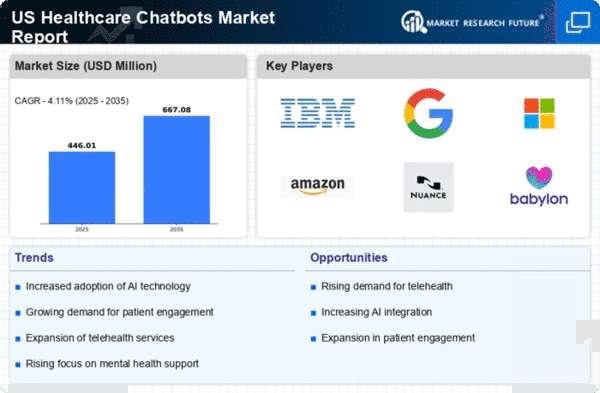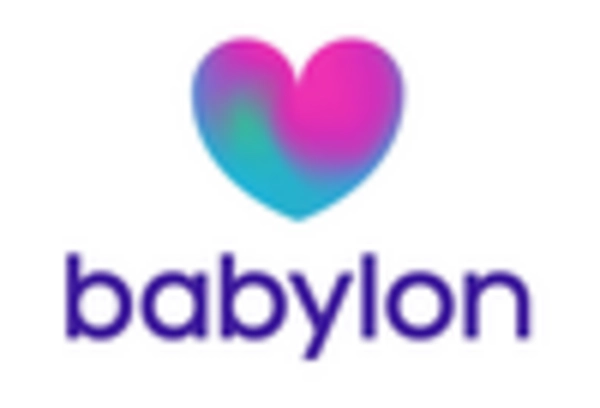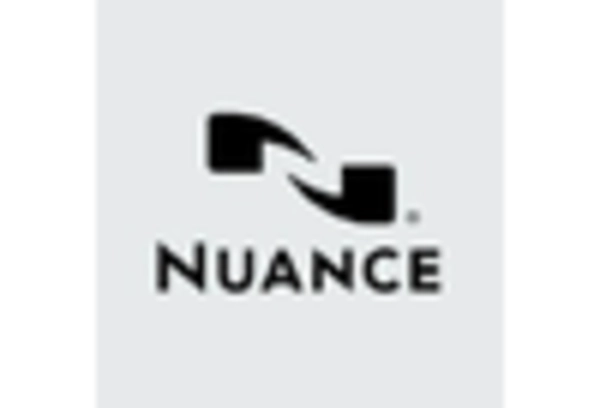Cost Efficiency in Healthcare Delivery
Cost efficiency is a critical driver in the healthcare chatbots market, as organizations seek to reduce operational expenses while maintaining quality care. Chatbots can handle routine inquiries and administrative tasks, allowing healthcare professionals to focus on more complex patient needs. This automation can lead to a reduction in staffing costs, with estimates suggesting that chatbots can save healthcare providers up to 30% in operational costs. Furthermore, the ability to manage a higher volume of patient interactions without proportional increases in staffing enhances the overall efficiency of healthcare delivery. As healthcare organizations in the US prioritize cost-effective solutions, the adoption of chatbots is likely to accelerate, further propelling the growth of the healthcare chatbots market.
Increased Focus on Mental Health Support
The growing awareness of mental health issues is influencing the healthcare chatbots market, as these digital tools are increasingly utilized to provide mental health support. Chatbots can offer immediate assistance, coping strategies, and resources for individuals seeking help, thereby addressing the rising demand for mental health services. In the US, studies indicate that nearly 1 in 5 adults experience mental illness, creating a substantial need for accessible support. By integrating chatbots into mental health care, providers can enhance service delivery and reach a broader audience. This trend is likely to contribute to the expansion of the healthcare chatbots market, as organizations recognize the potential of chatbots to improve mental health outcomes.
Rising Demand for 24/7 Healthcare Access
The healthcare chatbots market is experiencing a notable surge in demand for round-the-clock healthcare access. Patients increasingly seek immediate responses to their inquiries, which chatbots can provide without the constraints of traditional office hours. This shift is particularly evident in the US, where a significant % of patients express a preference for digital communication over in-person visits. The convenience of accessing healthcare information at any time enhances patient satisfaction and engagement. As a result, healthcare providers are investing in chatbot technology to meet this demand, thereby driving growth in the healthcare chatbots market. The market is projected to reach approximately 1.5 billion USD by 2026, reflecting the increasing reliance on digital solutions for healthcare access.
Advancements in Natural Language Processing
Advancements in natural language processing (NLP) technology are significantly impacting the healthcare chatbots market. Enhanced NLP capabilities enable chatbots to understand and respond to patient inquiries more effectively, improving user experience and satisfaction. As NLP technology continues to evolve, chatbots are becoming more adept at handling complex medical queries and providing accurate information. This improvement is crucial in the US, where patients expect high-quality interactions with digital health tools. The integration of sophisticated NLP features is likely to drive the adoption of chatbots in healthcare settings, as organizations seek to leverage these advancements to enhance patient engagement and streamline communication. Consequently, the healthcare chatbots market is poised for growth as NLP technology becomes more prevalent.
Regulatory Support for Digital Health Solutions
Regulatory support for digital health solutions is emerging as a key driver in the healthcare chatbots market. In the US, government initiatives aimed at promoting telehealth and digital health technologies are creating a favorable environment for chatbot adoption. Policies that encourage the use of technology in healthcare delivery are likely to facilitate the integration of chatbots into existing systems. Furthermore, regulatory bodies are increasingly recognizing the potential of chatbots to improve patient outcomes and streamline processes. As a result, healthcare organizations are more inclined to invest in chatbot technology, anticipating that regulatory support will enhance their operational capabilities. This trend is expected to contribute to the growth of the healthcare chatbots market, as organizations align their strategies with supportive regulatory frameworks.
















